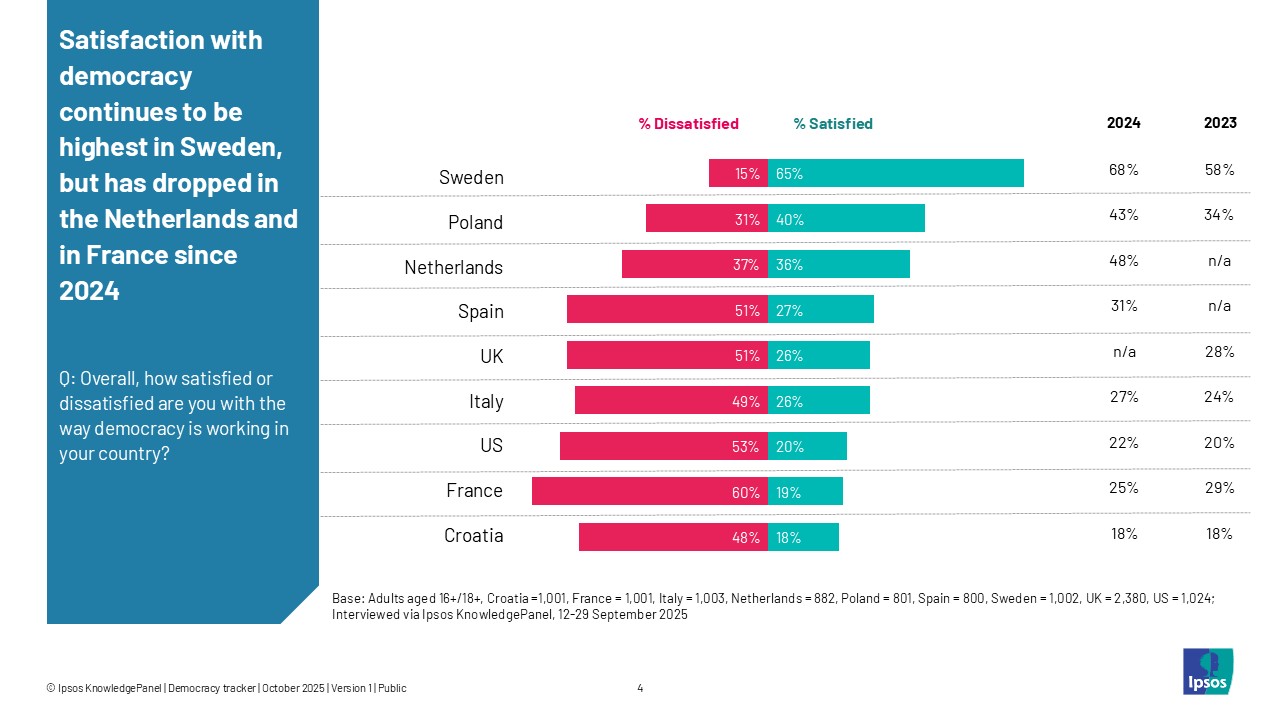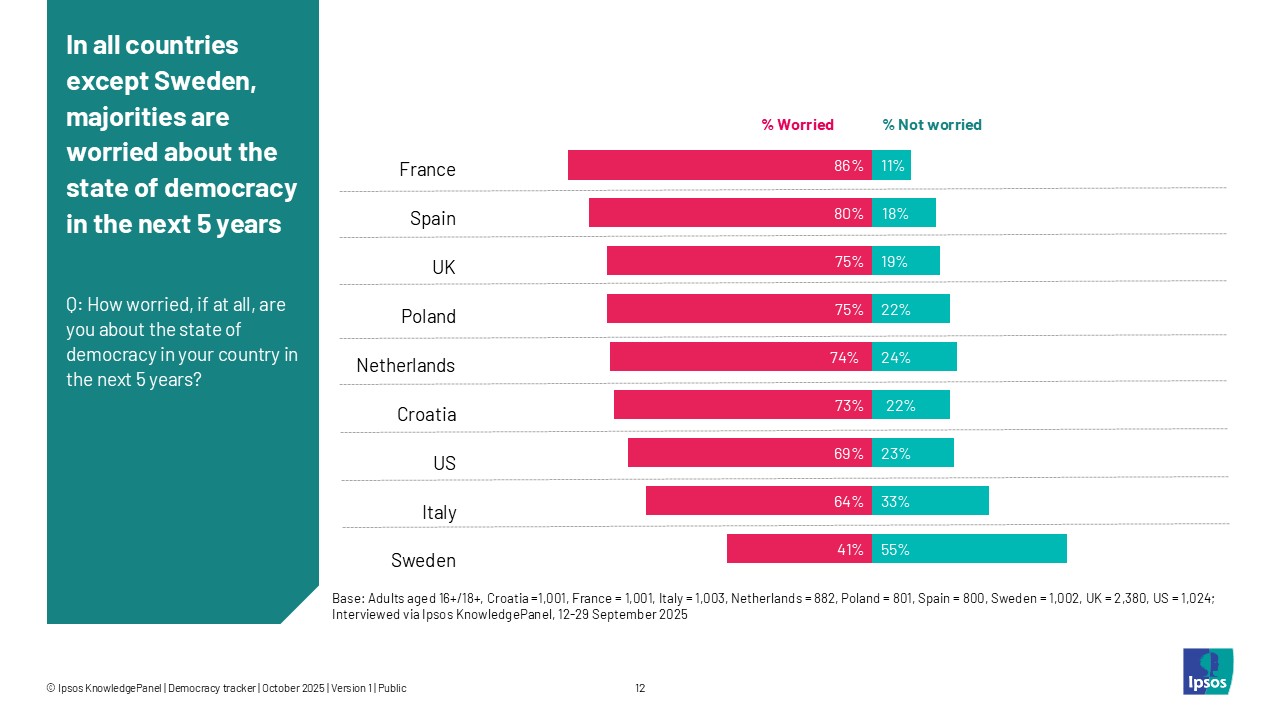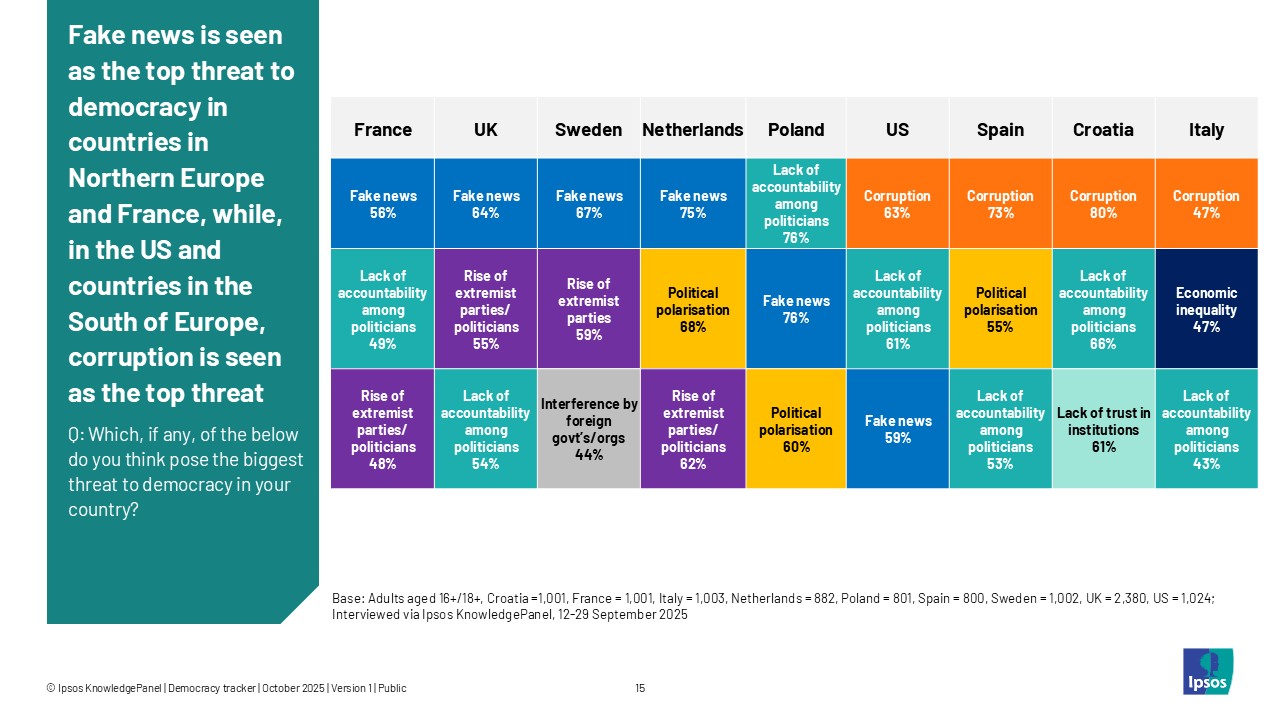

The State of Democracy 2025: Fake news, lack of accountability, extremism and corruption seen as top threats to democracy across Europe and the US
A new Ipsos KnowledgePanel survey in nine countries - Croatia, France, Italy, the Netherlands, Poland, Spain, Sweden, the UK and the US – finds satisfaction with democracy continues to be low everywhere except Sweden, with deep worries about the future state of democracy.
Key findings
- About half if not more in Spain, the UK, Italy, France, Croatia and the US are dissatisfied with the way democracy works in their country, with views most negative, and dropping, in France.
- Views are more mixed in Netherlands and Poland (but still have dropped sharply over the year in the Netherlands), but Sweden is the only country with a majority positive.
- Clear majorities in all countries except Sweden in the survey are worried about the state of democracy in the next 5 years, especially in France (86% worried) and Spain (80%).
- Nonetheless, majorities in almost all countries believe democracy is crucial to their society. Support for democracy in Croatia though is more contingent on delivering a good quality of life (51%).
- The main threats to democracy are seen to be fake news, lack of accountability among politicians, extremist parties/politicians, and corruption, with stronger anti-corruption laws and enforcement, independent courts, stronger social media regulation, and civic education all seen as most effective for strengthening democracy.
Detailed findings
Satisfaction with democracy continues to be low. Few are satisfied with how democracy is working in most countries in our study: Croatia (18% satisfied), France (19%), US (20%), Italy (26%), UK (26%) and Spain (27%). Views are split in Netherlands (36% satisfied, 37% dissatisfied) and Poland (40% satisfied, 31% dissatisfied), while Sweden is the only country in the survey where a majority are satisfied with how democracy is working (65%). Satisfaction has dropped in the Netherlands (12 points since 2024) and in France (6 points since 2024), pointing to the impact of recent political instability in the two countries, both having experienced government collapses in the last year.
Mirna Cvitan (Public Affairs Croatia) says:
Croatian citizens are highly concerned about the future of democracy, seeing it threatened above all by corruption, unaccountable politicians, and eroding trust in institutions. Uniquely, many take a pragmatic view: democracy must deliver a better quality of life to keep their support.

Perceptions that the state of democracy has got worse. In all countries aside from Poland, more say the way democracy is working has got worse compared to 5 years ago than has got better, with perceptions particularly negative in France (81% got worse), and Netherlands (76%), but also majorities in the US (61%), Spain and the UK (58% each). Poland, which saw a high turnout presidential election earlier this year, is the only country where more people say democracy has got better (42%) than worse (30%).
Mathieu Gallard (Public Affairs France) says:
France stands out as the most pessimistic country among those surveyed, when it comes to how democracy works. Across generations and political lines, frustration is rising and trust in institutions is sinking. Yet despite the gloom, most French people still believe democracy is worth fighting for - if it can be radically renewed.
Few feel governments at any level represent their views well, but local government tends to do better. In no country in our survey do a majority feel the national government represents their views a great deal or fair amount, with people in the UK and Croatia being the least likely among the 9 countries to say the national government represents their views (each 23%). City/local councils tend to perform better, though only in Netherlands and France do majorities feel well represented by their local councils (both 67%).
Worried about democracy in the future. Majorities in each country aside from Sweden say they are worried about the state of democracy in their country in the next 5 years: France (86%), Spain (80%), UK (75%), Poland (75%), Netherlands (74%), Croatia (73%), US (69%) and Italy (64%). In Sweden over half (55%) are not very worried. International organisations like the G7 and UN, and people’s national governments, are not seen as doing a good job defending democracy in most countries, though perceptions of the EU and NATO are more positive in Sweden (EU 48% good job, NATO 47%) and Poland (EU 45%, NATO 53%) compared with other countries or other institutions. Perceptions are most negative about the G7 (between 8-19% say it does a good job protecting democracy).
Alec Tyson (Public Affairs, US) says:
Many Americans remain deeply frustrated with the way democracy is working in the country, reflecting a sense that the system is broken with powerful interests prioritized over the needs of everyday citizens. Rising concerns about political violence and extremism in the U.S. are placing greater demand on the democratic system but also create a chance for leaders to meet public calls for greater unity and responsiveness in the nation’s politics.

Strong support for maintaining democracy. Across almost all countries clear majorities say democracy is crucial to society and we should do everything to maintain it – Sweden (87%), Netherlands (84%), Spain (73%), France (67%), Italy (67%), Poland (66%), UK (65%), US (65%). In Croatia, half say democracy is only worth keeping if it delivers a good quality of life for people (51%). Across all countries, very few (between 1-5%) say democracy is not worth keeping.
Christine Tresignie (European Public Affairs) says:
Europeans remain committed to democracy, but many feel it is being weakened by fake news, corruption, and unaccountable politics. With trust in institutions slipping in several countries, measures like the Digital Services Act show that the EU is responding - but citizens expect much more to protect the democratic system.
Fake news, lack of accountability, corruption and extremism seen as top threats to democracy. Fake news and the spread of false information is seen as the top threat to democracy in countries in Northern Europe – UK (64%), Sweden (67%Netherlands (75%), France (56%), and in Poland (76%, along with lack of accountability). Corruption is the biggest identified threat in the US (63%) and in countries in the South of Europe – Spain (73%), Croatia (80%), Italy (47%, along with economic inequality). Other common threats include lack of accountability among politicians, the rise of extremism, and political polarisation.
Asher van der Schelde (Public Affairs Netherlands) says:
Dutch citizens are more positive about their democracy than people in other European countries. Despite this relative optimism, their satisfaction with democracy has declined significantly over the past year. One particular concern sets the Dutch apart: they are especially worried about increasing political polarization. These issues present significant challenges for the new government that is currently being formed.

Stronger anti-corruption efforts, independent judiciary and social media regulations seen to strengthen democracy. Among a range of potential solutions for strengthening democracy, stronger anti-corruption laws and enforcement is seen as effective across most of the countries in the survey – UK (51%), Sweden (47%), Poland (63%), US (55%), Spain (76%), Croatia (78%), Italy (49%). Stronger regulation of social media is also seen as effective, especially in countries that identify fake news as a top threat – France (55%), UK (52%), Sweden (45%), Netherlands (58%), Poland (52%). Protecting the independence of the courts is also often mentioned, especially in Croatia (61%), Poland (70%), Spain (62%), Sweden (58%), and the Netherlands (57%).
Paco Camas (Public Affairs Spain) says:
Spain today navigates the same turbulent waters that are shaking much of Europe concerning the crisis of representation and the erosion of democracy. However, it does so with its own distinct currents that lend it a singular character on the continental map, exemplified by its level of saturation with the political situation and, notably, its profound concern regarding corruption.
Andrea Scavo (Public Affairs Italy) says:
Italians are the most sensitive to the economic dimension of democracy: economic inequalities are considered – together with corruption – as the biggest threat to democracy (whereas citizens in other countries do not put them even among the top three). The perception of economic distortions in Italy is strong: the ruling class and the economic system are seen to work in favor of the rich and the powerful.
Strong desire for radical change coexists with continuing support for democratic principles. Across most countries more people think the economy or the system are rigged in favour of the rich and powerful, as opposed to working for everyone, and we find support for radical change in most countries – Croatia (69%), France (66%), Italy (55%), Poland (60%), UK (60%), Spain (52%). Nonetheless, in all 9 countries we have studied, there is a preference for political leaders who build consensus over leaders who stick to their principles regardless of others, and, with the exception of Poland, in all countries majorities think it would be too risky to give the head of government more power without having to worry about votes in the legislature. We also find clear support for the view that voting can influence things, despite scepticism that getting personally involved in politics can help bring change. The view that voting can lead to change is growing in Croatia, Italy, Netherlands, Sweden and the UK.
Joanna Skrzynska (Public Affairs Poland) says:
The living memory of the communist era keeps Poles attached to democracy, but also highly alert to its abuse. They see some improvement yet worry about the years ahead - mainly due to lack of accountability among politicians, political polarisation, and fake news. The expected “repair of the state” sounds simple: protect independent courts, enforce anti-corruption, and improve civic education. In practice, given such deep political divisions, making this happen still feels out of reach.
Gideon Skinner (Public Affairs, UK) says:
Across the UK, the public are calling for a democracy that actually works for them. Many feel unheard and frustrated and worried about the future – but they haven’t given up on democracy itself. Britons want the system to improve radically, with real accountability and representation but preserving core democratic principles, and stronger safeguards against misinformation, corruption, and extremism. While the upcoming Elections bill is a chance for the new government to address specific concerns, the government also needs to show that democracy in Britain can deliver for everyone fairly.
Press Coverage
Read about our survey in Politico Read about our survey in the Guardian (UK)
Methodology
- This survey was conducted September 12 to 29, 2025 using KnowledgePanel®, Ipsos’ probability-based panels in Croatia, France, Italy, the Netherlands, Poland, Spain, Sweden, United Kingdom and the United States. Ipsos interviewed nationally representative samples of adults aged 18+: Croatia = 1,001, France = 1,001, Italy = 1,003 Netherlands = 882 , Poland = 801, Spain = 800, Sweden = 1,002, US = 1,024, and UK = 2,380 adults aged 16+.
- In each country panel members are recruited and sampled for surveys following probability principles:
- In the Netherlands, Poland, Spain, Sweden, the UK and the United States, panellists are recruited via address-based sampling methods using databases with full or near full coverage of the population. Letters are sent to selected individuals or addresses inviting them to become members of the panel. Invited households can sign up to the panel by completing a short online survey or by returning a paper form.
- In Croatia, France, Italy, panellists are recruited via random probability telephone-based sampling method. Telephone numbers are randomly generated using an algorithm that conforms to the properties of valid phone numbers in a country to obtain a representative sample of the country population. A dual frame design ensures coverage of households with only a landline phone and maximises contact with dual phone owners.
- In France and Poland, a combination of probability telephone-based and address-based sampling were employed for panel recruitment.
- In the UK and US, panelists who do not already have internet access are provided a tablet and internet connection at no cost to the panel member. In the other countries, those who are digitally excluded are registered to the KnowledgePanel by telephone and are then interviewed for surveys via telephone.
- Data are weighted to match the profile of the population. All polls are subject to a wide range of potential sources of error.



